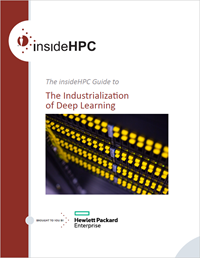
Deep learning is a method of creating artificial intelligence systems that combine computer-based multi-layer neural networks with intensive training techniques and large data sets to enable analysis and predictive decision making. This insideHPC special report explores the technologies, components and software required for creating successful learning environments.
A fundamental aspect of our environment is that they transcend finite programmable constraints to the realm of extensible and trainable systems. Recent developments in technology and algorithms have enabled our learning systems to not only equal but to exceed human capabilities in the pace of processing vast amounts of information.
Without the speed and capacity for unsupervised learning being demonstrated by our learning systems we progressively fall behind in our ability to filter information and bring it effectively into human based decision systems. Well trained systems can fundamentally alter the economic, productivity and value propositions of business and any other kind of human interaction. We have the hardware to create the systems that are sufficiently capable, now we need to focus on how to train them rather than thinking about how to program them.
Driven initially by internet connectivity and increasingly by a flood of internet connected devices—the ‘Internet of Things’—we are deluged with data and overwhelmed by the inability to process it. Even though conventional computer-based systems can process data much faster than human beings, they still need to follow programmed instructions, and the pace at which we can reprogram them is still governed by human constraints. Deep learning changes that fundamentally by creating systems that can be trained autonomously, and the quality of the training becomes critical to the quality of precision and recall of the results and inferences made. Without the speed and capacity for unsupervised learning being demonstrated by deep learning systems we progressively fall behind in our ability to filter information and bring it effectively into human based decision systems. Well trained deep learning systems can fundamentally alter the economic, productivity and value propositions of business and any other kind of human interaction. We have the hardware to create the systems that are sufficiently capable, now we need to focus on how to train them rather than thinking about how to program them.
All information that you supply is protected by our privacy policy. By submitting your information you agree to our Terms of Use.
* All fields required.




